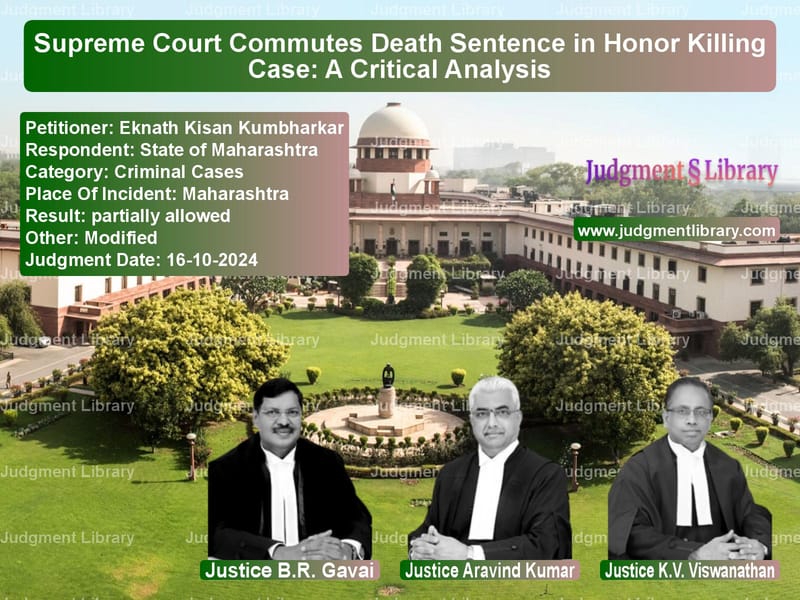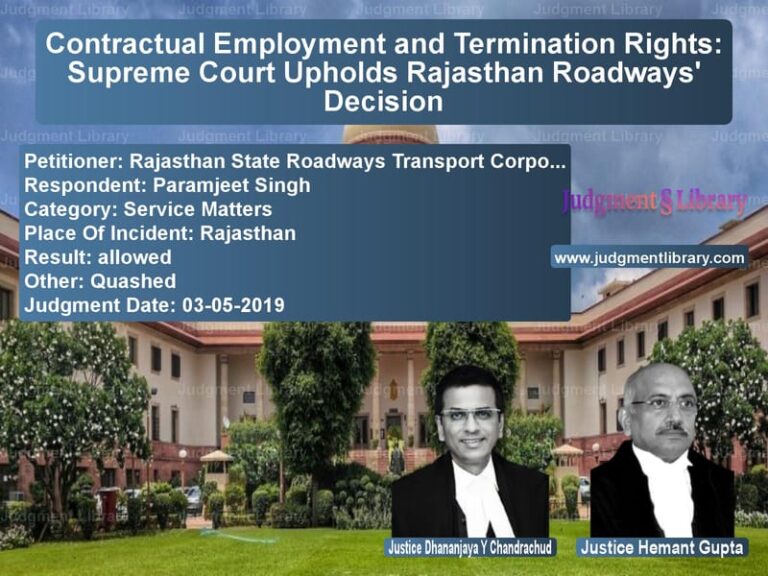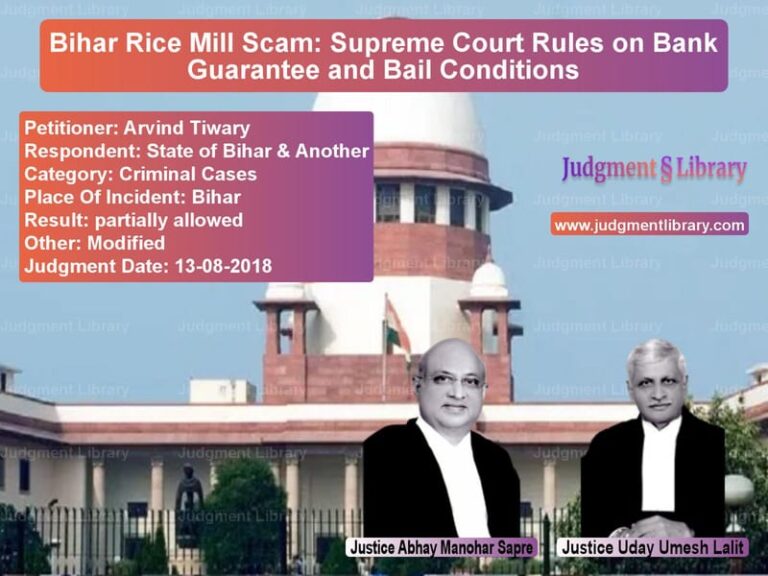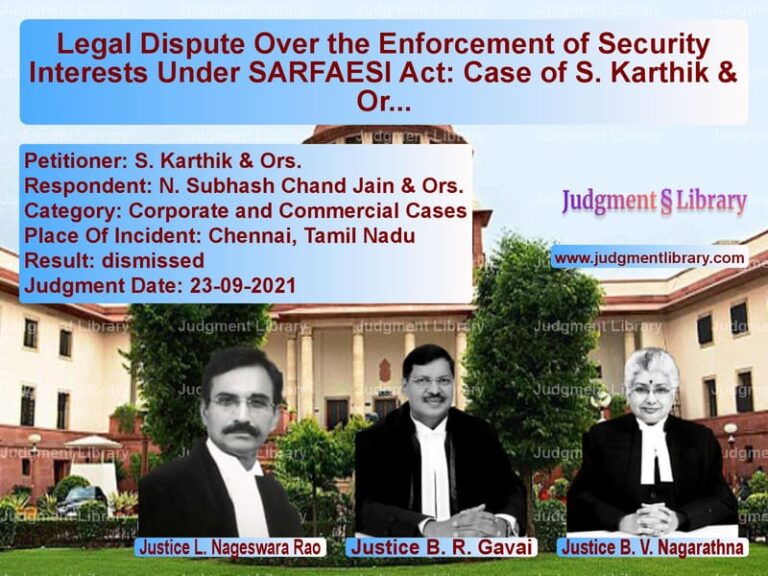Supreme Court Commutes Death Sentence in Honor Killing Case: A Critical Analysis
The case of Eknath Kisan Kumbharkar vs. State of Maharashtra is a significant Supreme Court ruling concerning the commutation of a death sentence to life imprisonment in a brutal honor killing. The judgment, delivered on October 16, 2024, highlights the principles governing capital punishment, mitigating circumstances, and the rarest of rare doctrine in the Indian criminal justice system.
Background of the Case
The appellant, Eknath Kisan Kumbharkar, was convicted for the murder of his pregnant daughter, Pramila, who had married outside her caste against his wishes. The prosecution’s case was that on June 28, 2013, the appellant lured his daughter from her matrimonial home under the false pretense of taking her to visit her ailing grandmother. Instead, he strangled her near Savkar Hospital while traveling in an autorickshaw driven by the complainant, PW2.
The Sessions Court convicted the appellant under Sections 302 (murder), 316 (causing the death of an unborn child), and 364 (kidnapping) of the Indian Penal Code (IPC) and sentenced him to death. The Bombay High Court confirmed this sentence in 2019, leading to the present appeal before the Supreme Court.
Petitioner’s Arguments
- The prosecution failed to establish motive convincingly. The appellant had accepted his daughter’s inter-caste marriage and had continued to maintain contact with her.
- There were contradictions in the testimony of key witnesses, particularly PW2 and PW3.
- Several crucial independent witnesses, including the hospital watchman and neighbors, were not examined.
- The alleged murder weapon, a rope, was not directly linked to the appellant.
- The appellant’s poor socioeconomic background and history of parental neglect should be considered mitigating factors.
- He suffered from serious health issues, including ischemic heart disease, cognitive impairment from a stroke, and post-conviction mental illness.
Respondent’s Arguments
- The prosecution successfully established that the appellant took his daughter away on false pretenses and later strangled her.
- The eyewitness (PW2) directly saw the appellant strangulating the victim.
- The forensic evidence confirmed asphyxiation as the cause of death, consistent with strangulation.
- The appellant had a strong motive for committing the crime, as evidenced by testimony from his wife (PW1), who stated that he was humiliated by his daughter’s inter-caste marriage.
- The crime was particularly heinous as the victim was nine months pregnant, and the act constituted an honor killing.
Supreme Court’s Observations
- The Court noted that while the prosecution had established the appellant’s guilt beyond reasonable doubt, there were mitigating factors that warranted reconsideration of the death penalty.
- It acknowledged the appellant’s adverse childhood experiences, financial struggles, and lack of prior criminal history.
- It recognized that the appellant had shown good conduct in prison, and his deteriorating health condition reduced the risk of future violent behavior.
- The judgment cited previous rulings that emphasize that capital punishment should only be imposed in cases where the possibility of reformation is entirely ruled out.
- The Court concluded that this case did not fall under the ‘rarest of rare’ category requiring the death penalty.
Supreme Court’s Ruling
- The conviction under Sections 302, 316, and 364 IPC was upheld.
- The death penalty was commuted to a fixed-term sentence of 20 years of rigorous imprisonment without remission.
- The Court clarified that the appellant would not be entitled to seek remission before completing the full 20-year sentence.
- The ruling reinforced that capital punishment should be reserved only for cases where there is no possibility of reform.
Legal Implications of the Judgment
This ruling has significant consequences for criminal law and the application of the death penalty:
- Restricting Capital Punishment: The judgment reinforces the Supreme Court’s stance that the death penalty should be imposed sparingly and only when all other sentencing options are inadequate.
- Recognition of Mitigating Factors: The Court considered the appellant’s background, mental health, and prison conduct, setting a precedent for more holistic sentencing.
- Clarification on Rarest of Rare Doctrine: The ruling provides further guidance on what constitutes a ‘rarest of rare’ case, emphasizing the need for individual assessment rather than categorical classification.
- Fixed-Term Sentences as a Middle Path: The Court opted for a middle-ground approach, ensuring that justice is served while avoiding irreversible capital punishment.
Conclusion
The Supreme Court’s decision in this case strikes a balance between delivering justice for a heinous crime and ensuring that capital punishment is not imposed indiscriminately. The judgment underscores the importance of assessing an offender’s background, mental state, and potential for reformation before awarding the death penalty. By commuting the death sentence to a fixed-term rigorous imprisonment, the Court has reinforced the principle that every convict deserves a chance at rehabilitation, even in cases involving extreme brutality.
Petitioner Name: Eknath Kisan Kumbharkar.Respondent Name: State of Maharashtra.Judgment By: Justice B.R. Gavai, Justice Aravind Kumar, Justice K.V. Viswanathan.Place Of Incident: Maharashtra.Judgment Date: 16-10-2024.
Don’t miss out on the full details! Download the complete judgment in PDF format below and gain valuable insights instantly!
Download Judgment: eknath-kisan-kumbhar-vs-state-of-maharashtra-supreme-court-of-india-judgment-dated-16-10-2024.pdf
Directly Download Judgment: Directly download this Judgment
See all petitions in Murder Cases
See all petitions in Bail and Anticipatory Bail
See all petitions in Judicial Review
See all petitions in Legal Malpractice
See all petitions in Judgment by B R Gavai
See all petitions in Judgment by Aravind Kumar
See all petitions in Judgment by K.V. Viswanathan
See all petitions in partially allowed
See all petitions in Modified
See all petitions in supreme court of India judgments October 2024
See all petitions in 2024 judgments
See all posts in Criminal Cases Category
See all allowed petitions in Criminal Cases Category
See all Dismissed petitions in Criminal Cases Category
See all partially allowed petitions in Criminal Cases Category







